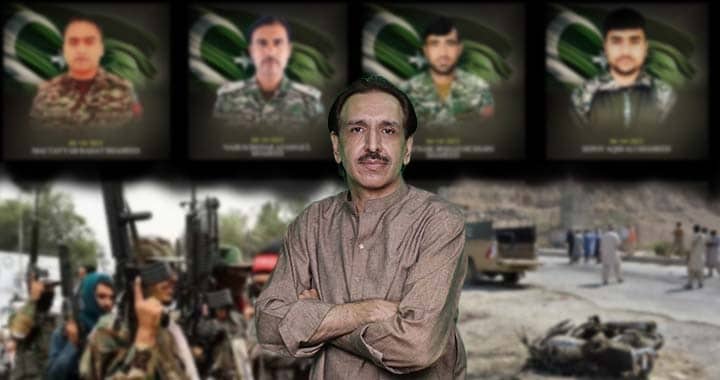Aqeel Yousafzai
In the midst of Pakistan’s renewed campaign against terrorism, the security landscape of the region is undergoing a subtle but defining transformation. Counterterrorism operations within Pakistan have entered a delicate yet decisive phase, with security forces intensifying their efforts to dismantle militant networks across the tribal districts and adjoining divisions. Encouragingly, local communities have expressed strong solidarity with the security forces, reflecting a growing realisation that peace and stability are shared responsibilities. Yet, the critical question persists: can Pakistan ensure enduring security as long as terrorist groups continue to operate from across the border in Afghanistan?
The timing of these developments coincides with renewed regional diplomacy under the Moscow Format, which recently brought together key regional stakeholders China, Russia, Iran, and Pakistan alongside Afghanistan’s acting Foreign Minister, Amir Khan Muttaqi. The meeting, described by many as a “regional alignment,” carries deeper implications for the collective fight against terrorism and the broader geopolitical interests shaping South and Central Asia.
Two major dynamics are unfolding in the region. First, China’s growing role cannot be overlooked. As a local stakeholder with massive investments particularly under the China-Pakistan Economic Corridor (CPEC) and related infrastructure projects Beijing’s economic interests hinge entirely on regional peace. Any instability threatens the billions of dollars it has poured into Pakistan, Afghanistan, and Central Asia. Second, Russia and the Central Asian republics especially Uzbekistan and Tajikistan, view Afghanistan’s instability with growing concern. Over two dozen militant groups remain active or re-emerging within Afghan territory, and their potential spillover into Central Asia poses an immediate threat. Reports suggest that elements linked to Chinese and Central Asian militants are regrouping, receiving new funding, and that Al-Qaeda’s reappearance has added to regional anxieties.
For both Moscow and Beijing, the return of militancy in Afghanistan represents not just a security dilemma but a strategic challenge. Pakistan, being the only state currently engaged in an open and sustained war against these groups, remains at the centre of this storm. The cost of this prolonged conflict has been immense, both in lives and resources. However, a key question remains unresolved whether the emerging cooperation between Pakistan, China, and Russia will align with or diverge from the still-murky counterterrorism framework being discussed between Pakistan and the United States. Much depends on whether the U.S. and its regional counterparts genuinely seek stability in Afghanistan or continue to play out competing strategic interests on its soil.
The Moscow Format meeting made one principle clear: Afghanistan’s territory must not be used for terrorism, and its government must evolve into an inclusive political structure. Yet, the Taliban government shows little inclination toward inclusivity or meaningful reform. The Doha Agreement, negotiated under Zalmay Khalilzad during the Trump administration, sidelined Afghanistan’s political stakeholders, including the then Ashraf Ghani government. The result was a narrow power structure in Kabul, leaving many former Taliban allies outside the current government’s control. This fragmentation continues to pose challenges not only for Afghanistan but for Pakistan as well, as cross-border militant groups find sanctuary and support.
Amid these developments, Afghan Foreign Minister Amir Khan Muttaqi’s recent diplomatic outreach, particularly to India, has raised eyebrows in Islamabad and beyond. India’s past involvement in Afghanistan, often framed as developmental and humanitarian, now appears to be evolving into a strategic partnership with the Taliban regime a move many in Pakistan view as an attempt to counterbalance Islamabad’s influence in the region. Indian media’s extraordinary focus on Muttaqi’s visit underscores this policy shift. While Afghanistan has every sovereign right to engage with other nations, the timing — when relations between Islamabad and New Delhi remain tense suggests a deliberate strategic message. This renewed India-Afghanistan engagement could exacerbate tensions rather than contribute to regional stability.
Meanwhile, Pakistan’s internal front remains complex. The recent deadly attack in Kurram and Orakzai districts, which claimed the lives of several security personnel including a lieutenant colonel and a major, highlights the persistent threat posed by the Tehreek-e-Taliban Pakistan (TTP). Despite the security forces’ effective counter-strikes, the political leadership’s response in Khyber Pakhtunkhwa has drawn criticism. The resignation of a provincial minister and the controversial appointment of another figure reportedly sympathetic to anti-operation rhetoric have raised questions about the provincial government’s seriousness in combating terrorism. In such a volatile security environment, political instability and poor governance only deepen the crisis.
The broader concern is that when provincial administrations adopt policies that run contrary to state and military objectives, the coherence required for counterterrorism efforts is weakened. The TTP’s recent resurgence underscores the urgency for unified civil-military coordination. As long as political divisions continue to overshadow the national security agenda, the path to lasting peace will remain uncertain.
In essence, Pakistan’s struggle against terrorism is no longer a domestic issue it is deeply intertwined with regional power realignments. The Moscow Format represents a renewed effort to build consensus among regional powers whose security and economic futures depend on Afghan stability. Yet, unless Afghanistan curbs militant sanctuaries and adopts genuine inclusivity, Pakistan will continue to bear the brunt of cross-border terrorism.
The road to regional peace runs through Kabul but its stability depends on the collective sincerity of its neighbours and global powers alike. For Pakistan, success will require not only military resolve but also political clarity and unity at home.





